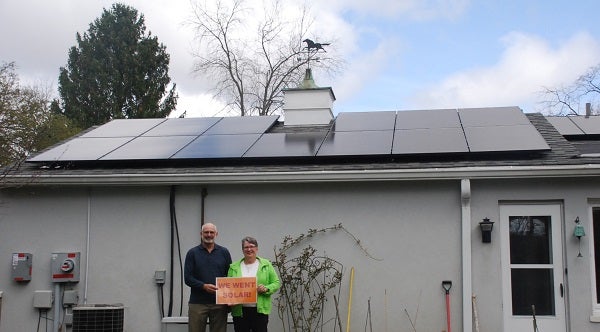Turning a carbon fee into solar on rooftops

This May, voters in Athens, Ohio took a strong step to expand access to solar. The community voted to encourage solar adoption and energy conservation by placing a small fee on carbon production. The ballot proposal passed by a more than 3-to-1 margin.
The fee will only apply to members of the Southeast Ohio Public Energy Council (SOPEC). SOPEC coordinates community choice aggregation in the region. Community choice aggregation empowers communities to choose their energy source without changing their electricity provider. SOPEC works on behalf of residents to replace default electric generation and natural gas supply pricing with a lower rate from the retail market. As illustrated in this video, aggregation ensures that energy consumers who don’t wish to shop around for their retail electricity will still get competitively priced energy.
The new carbon fee will add 0.2 cents per kilowatt-hour per month for SOPEC households. This will translate into an additional average $1.70 charge for a typical home. Those who don’t wish to pay the fee can opt out of the aggregation program entirely. The fee will likely go into effect in 2019 or 2020.
“The overwhelming support in Athens, Ohio for the carbon fee came from the fact that the proposal was reasonable and revolutionary at the same time,” said Mathew Roberts, UpGrade Ohio’s Info and Outreach Director.
UpGrade Ohio was a key driver of the push for the fee. Part of the non-profit’s mission is to provide pathways to solar energy to low-to-moderate income Ohioans. To that end, it launched a program called Solar ACCESS. The program will complete a solar installation at a local high school later this month. The installation is currently being financed with a traditional PPA, but that was not the original plan. The initial concept was to fund it by using complex solar investment packages called the Community Solar Investment Fund.
When this model proved unworkable, the organization switched gears. It decided a carbon fee, paid by energy users, would be a better path to fund new solar projects on public buildings.
From late winter to spring, UpGrade Ohio undertook a public education campaign around the ballot initiative. It built a website, produced fact sheets, and distributed yard signs. It also hosted public information sessions in partnership with the City of Athens, Ohio University, the League of Women Voters, and local businesses.
“This is what happens when you have local leaders, largely elected officials, talking to each other,” Roberts said. “The Athens County Commissioners realized that adding their own carbon fee was a way to show the entire community that we can work together for sustainability.”
They also pursued other effective media strategies including articles, letters to the editor, and social media posts. The result was significant local and even national coverage of the issue in print and broadcast media.
Roberts pointed out that SOPEC didn’t need to ask for a vote to implement the carbon fee, since its rules allow it to establish such fees without voter approval. However, they considered it undemocratic not to submit the matter to a public vote first.
The move has proved popular. The City of Athens is also the seat of Athens County. The city’s approval of the carbon fee has inspired the county to develop a similar fee as well. The county will set aside a certain percentage of money it pays for its mercantile energy accounts to fund renewable energy projects locally.
“UpGrade Ohio is now particularly interested in scaling this [carbon fee] model to other communities across Ohio,” Roberts said.
Roberts linked the success of the campaign to being “real with people”. He said that advocates shouldn’t hesitate to call it a “fee”, as that is what it is. Roberts recommends hammering home the point that everyone retains the option of not participating in this program, that savings would be achieved by the local government through the fee and that the cost is reasonable.
“For less than the price of a cup of coffee, and only once per month, you can support clean energy in your community,” Roberts said.
